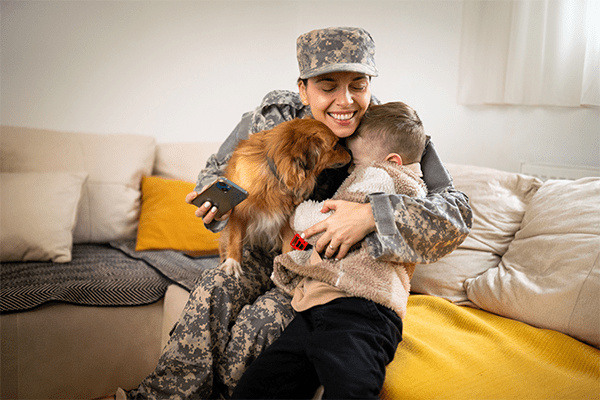Healing from Co-Parenting Conflict: Building Trust and Collaboration
Strategies for co-parents to build trust and collaboration after dealing with conflicts.
- 5 min read
- custody
- divorce
- guest author

Imagine Sophia and Marcus, divorced co-parents of their 6-year-old child Olivia. One day, Marcus discovers that Sophia enrolled Olivia in extracurricular activities without first consulting him.
Feeling excluded from important decisions, Marcus confronts Sophia and accuses her of disregarding his role as a parent. As a response, Sophia defensively argues that she had to make the decision due to Marcus’ indecisiveness in the past.
The lack of trust and collaboration in their relationship leads to constant disagreements and tension, as both sides are not willing to compromise. This affects their ability to co-parent properly and may lead to negative consequences for their child, Olivia. In this article, we will discuss strategies to handle conflicts and collaborate with your co-parent.

Understanding co-parenting conflicts
Conflicted co-parenting is characterized by minimal to no cooperation between parents. High-conflict parents have difficulty maintaining a professional relationship, which is needed in healthy co-parenting.
Common causes of conflicts for co-parents include:
- Different parenting styles
- Poor communication
- Lingering negative emotions from the separation
- Financial disagreements
- Challenges in coordinating schedules
- Feelings of competition between co-parents
Co-parents need to prioritize cooperation because conflicts can have a negative impact on children. A study published in 2016 examined how parent’s feelings, parenting style, and conflict with the other parent can affect their children after a divorce. The researchers found that when parents felt more distressed or had many arguments with the other parent, their children were likely to have emotional and behavioral issues. It’s normal for parents who share a child to have disagreements, but if these start affecting how you care for the child and, most importantly, the child’s welfare, it’s time for a change.
Strategies for building trust
If you and your co-parent often have disagreements, know it’s possible to build trust again. This way, you can promote a positive co-parenting environment that will be for the good of the child.
Set clear boundaries
Boundaries can help define each co-parent’s role and responsibilities in parenting. By knowing what to expect from each other, you can avoid misunderstandings and power struggles. This can also help you and your co-parent care for your child without involving your personal feelings about each other. Boundaries can create a sense of reliability, which helps build trust in your partnership over time.
Identify important areas where boundaries are needed. For instance, you could determine who will be responsible for your child’s education, health, or extracurricular activities. Set guidelines on communication, visitation schedules, and special occasions. Make sure that both parents agree to follow the parenting plan.
Be consistent but flexible
Inconsistency can cause your child to feel confused about what to follow. For example, a child might need to follow a rule that they need to finish homework before watching TV. However, in the other parent’s house, no such rule exists. Be consistent in routines, rules, and expectations across households. This creates predictability for the child, so they understand what to expect. Moreover, co-parents who agree on the same routines and rules are creating a foundation of trust.
On the other hand, it is also important to be flexible because life is unpredictable, and your child’s needs change. Being open to adjustments promotes trust in one another and reduces conflict.
Practice forgiveness
It’s difficult to co-parent with someone who hurt you, but bitterness and resentment can only lead to conflict, making it difficult to have proper conversations about your child’s needs. As a result, the child may find themself in a stressful environment. Forgiveness helps you to let go of the negative emotions and move forward. It also shifts your focus from your hurt to your child’s needs. You can choose to forgive and let go of the emotional pain while still having boundaries.
To be able to forgive, you need to process your emotions. Acknowledge that you’ve been hurt and take time to reflect on what is triggering your pain and resentment. You can consider seeking the support of a mental health professional to heal.

Cultivating collaboration through open communication and shared goals
You can promote collaboration with your co-parent by having an open line of communication where you can both express your thoughts, concerns, and expectations and be heard. For co-parenting to work, you need to have shared goals for your child. Having a co-parenting plan can guide you on your responsibilities as a parent. A written agreement can help avoid misunderstandings and can serve as a reference point when conflicts arise.
Co-parenting communication techniques
Miscommunication is one of the main causes of conflicts between co-parents, so having the right communication techniques can help you improve collaboration. Here are some tips that will help:
Stay calm and collected
You can avoid most arguments when you communicate your thoughts in a calm or collected way.
It might be tempting to respond immediately if you feel offended, but giving yourself a moment to pause before responding allows you to regulate your emotions and cool down. Taking a pause also allows you to gather your thoughts and formulate a meaningful response. If you focus on finding solutions instead of the issue, you can also shift the conversation from blaming to problem-solving.
Establish a communication plan
A communication plan can help you minimize conflicts with your co-parent by giving you a guide for interaction. First, you can choose communication channels where you can talk, such as email, text messaging, or a co-parenting app. Find a schedule when you can have check-ins, updates, or times to discuss matters regarding your child. Lastly, you can also use a shared calendar to coordinate schedules for visitation, school events, holidays, and special occasions.

What to do if co-parenting becomes more challenging
The key to a successful co-parenting relationship is the ability to put your child’s needs ahead of your own. However co-parenting can be challenging if you are still adjusting to the separation, disagree on many areas of parenting, or dealing with other problems. In this case, you can seek support from a professional.
One option is to consider mediation, where there is a neutral third party that can help you communicate and reach agreements with your co-parent. You can also seek counseling or therapy to address emotional challenges and learn how to resolve conflicts with your co-parent. Legal professionals can give you advice on your rights and responsibilities as a parent.
Other than these, you might also consider joining a co-parenting support group to connect with other people who are experiencing the same challenges.
Focus on your child’s needs
Building trust is a gradual process and will take time, but it will be worth it for the good of your child. When you face challenges in co-parenting, keep your child at the center and think of what is best for them. This can help you build a more trusting and cooperative relationship with your co-parent.